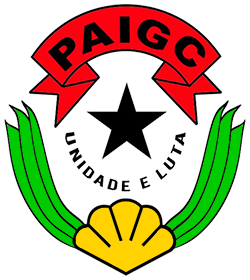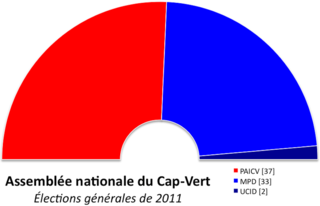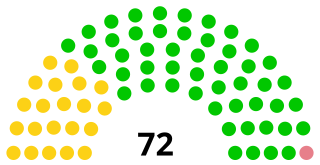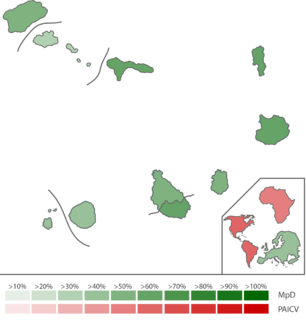
Politics of Cape Verde takes place in a framework of a semi-presidential representative democratic republic, whereby the Prime Minister of Cape Verde is the head of government and the President of the Republic of Cape Verde is the head of state, and of a multi-party system. Executive power is exercised by the President and the Government. Legislative power is vested in both the Government and the National Assembly. The Judiciary is independent of the executive and the legislature. The constitution first approved in 1980 and substantially revised in 1992 forms the basis of government organization. It declares that the government is the "organ that defines, leads, and executes the general internal and external policy of the country" and is responsible to the National Assembly.

The recorded history of Cape Verde begins with Portuguese discovery in 1456. Possible early references go back around 2000 years.

Pedro de Verona Rodrigues Pires was the President of Cape Verde from March 2001 to September 2011. Before becoming President, he was Prime Minister from 1975 to 1991.

José Maria Pereira Neves is a Cape Verdean politician who was Prime Minister of Cape Verde from 2001 to 2016. He is a member of the African Party for the Independence of Cape Verde (PAICV).

The African Party for the Independence of Guinea and Cape Verde is a political party in Guinea-Bissau. Originally formed to peacefully campaign for independence from Portugal, the party turned to armed conflict in the 1960s and was one of the belligerents in the Guinea-Bissau War of Independence. Towards the end of the war, the party established a Marxist–Leninist one-party state, which remained intact until multi-party democracy was introduced in the early 1990s. Although the party won the first multi-party elections in 1994, it was removed from power in the 1999–2000 elections. However, it returned to office after winning parliamentary elections in 2004 and presidential elections in 2005, since which it has remained the largest party in the National People's Assembly.

The Movement for Democracy is a Christian democratic and liberal party in Cape Verde. Established in 1990, it was the ruling party from 1991 to 2001 and returned to power in the 2016 parliamentary election. Its members are nicknamed "os ventoinhas".

The Struggle Front for the National Independence of Guinea was a political movement in Guinea-Bissau. Founded by groups opposed to the Marxist doctrine of Amílcar Cabral and the African Party for the Independence of Guinea and Cape Verde (PAIGC), FLING played a minor role in the national liberation struggle against Portuguese colonial rule.
The Democratic and Independent Cape Verdean Union is a conservative political party in Cape Verde.
The Labour and Solidarity Party is a political party in São Vicente, Cape Verde led by Gilson Alves.

The Modernize São Vicente Movement is a political party in São Vicente, Cape Verde.

The unicameral National Assembly is the legislative body of the Republic of Cape Verde.
The Social Democratic Party is a political party in Cape Verde.

Parliamentary elections were held in Cape Verde on 22 January 2006. The result was a victory for the ruling African Party for the Independence of Cape Verde (PAICV) run by José Maria Neves, which won 41 of the 72 seats in the National Assembly. Second was the Movement for Democracy (Mpd) and third was Democratic and Independent Cape Verdean Union (UCID) led by João Santos dos Luís.

Parliamentary elections were held in Cape Verde on 14 January 2001. The result was a victory for the African Party for the Independence of Cape Verde run by José Maria Neves, which won 40 of the 72 seats in the National Assembly, defeating the ruling Movement for Democracy led by Carlos Veiga. Third was the Democratic Alliance for Change (ADM) led by José dos Santos Luís with 6.12% of the votes.

Parliamentary elections were held Cape Verde on 6 February 2011. The result was a victory for the ruling African Party for the Independence of Cape Verde (PAICV), led by Prime Minister Jose Maria Neves, which won 38 of the 72 seats in the National Assembly.

Parliamentary elections were held in Cape Verde on 17 December 1995. The number of seats was reduced from 79 to 72. The result was a victory for the ruling Movement for Democracy, which won 50 of the 72 seats. Voter turnout was 76.52%.

The Democratic Social Front is a political party in Guinea-Bissau.

Parliamentary elections were held in Cape Verde on 20 March 2016. The ruling African Party for the Independence of Cape Verde (PAICV), led by Janira Hopffer Almada, was defeated by the Movement for Democracy (MpD), led by Ulisses Correia e Silva.
















